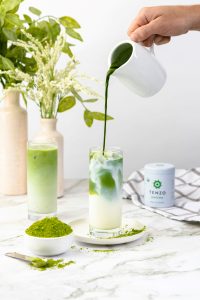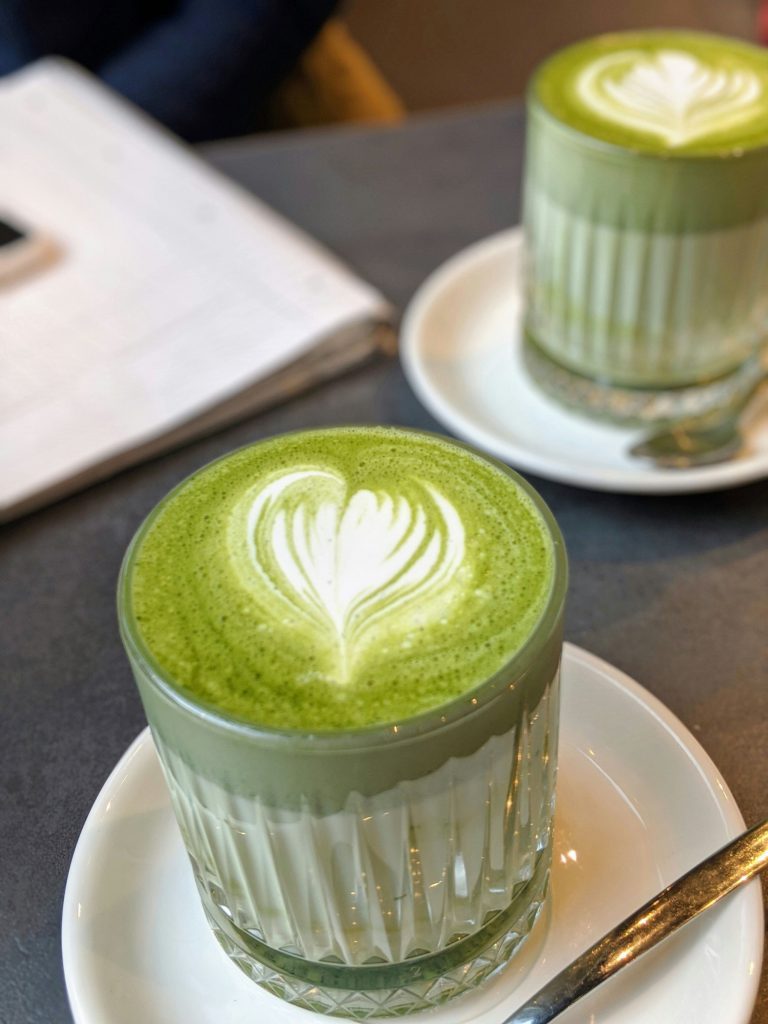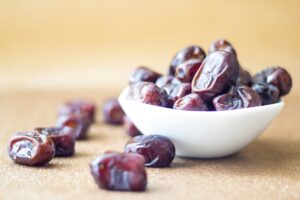Matcha is a highly concentrated form of green tea, made from leaves of the Camellia sinensis plant. All tea – black, green and oolong tea – comes from the Camellia sinensis plant, but varies in how it is produced and handled. Black tea leaves are left to oxidize before use, which is a natural process that exposes the leaves to the elements and allows for them to turn black (think photosynthesis), while green teas are secured in their unoxidized state by means of a heating process, allowing them to retain their green color. Oolong tea undergoes a unique process where it is partially oxidized.
From there, most teas are prepared by placing the leaves in a tea bag and setting it in hot water. But not matcha. Matcha is unique in that the leaves are ground up into a powder, and that powder is infused directly into a drink or food item. Because matcha drinkers consume the actual ground tea leaves, they are receiving a higher concentration of the tea and its ingredients than other tea drinkers.
There are some differences in taste too. Amity Lui, a sports dietitian at Worksite Wellness Nutrition in New York City, says that other green teas are “typically much lighter in taste, perhaps refreshing, whereas matcha can be described as a sweet, nutty flavor with some hints of grassiness.”
 Where did matcha come from?
Where did matcha come from?
Matcha originates from East Asia, having been discovered by Chinese and Japanese Buddhist monks who used the substance to achieve a “calm, relaxative state that aided in meditation,” Lui says.
Matcha has cultural significance and has been used in rituals and tea ceremonies. A traditional Japanese tea ceremony is called “chado,” which translates to “the way of tea,” and may also be referred to as “chanoyu,” which translates to “hot water for tea,” Lui explains. These ceremonies can last up to four hours, she says.
The Health Benefits of Matcha
Researchers continue to brew new insights on how green tea’s properties may support the body and mind, ranging from increasing hair growth to decreasing risks of cognitive decline.
Some findings are listed below – but make sure to take them with a grain of salt (or a tablespoon of sugar). Many of matcha’s benefits come from potent doses of tea extract, which are not equivalent to a cup of your favorite latte.
High in antioxidants
Matcha’s rich antioxidant content and catechin presence make it a promising health food. Richter says that antioxidants found in matcha “can help to protect cells from oxidative damage which we accumulate every day from water, food, air and even emotional things like stress,” and may reduce cancer risks.
Supports liver health
Some studies suggest that green extract may have liver benefits, like helping the body fight against fatty liver disease. However, green tea catechins – EGCG in particular – can be toxic to the liver when consumed regularly in excess.
Boosts brain function
Matcha also contains L-theanine, an amino acid known for its calming effects that may help regulate brain function. “L-theanine can help relieve stress, lower blood pressure, boost cognitive functions (i.e. memory) and improve mood and sleep,” Lui says.
L-theanine is present in all types of tea from the Camellia sinensis plant and is not exclusive to matcha or the green tea family, but it can be more potent in matcha. Lui says that matcha can contain up to five times the L-theanine content as regular green tea.
Matcha is also high in caffeine, which can increase feelings of alertness and concentration. Lui says an average cup of matcha contains about 60 to 70 milligrams of caffeine. This is slightly higher than the average caffeine content of all teas which hovers between 30 to 50 mg and slightly lower than the average caffeine content of coffee, which ranges between 80 to 100 mg, according to the Food and Drug Administration.
In comparison to coffee, Lui says “the caffeine in matcha is found to have a gentler release, which lengthens the period of alertness without the sudden crash from a caffeine dip.” Paired with L-theanine, “you can think of matcha as providing a more ‘steady energy.’”
However, “caffeine isn’t tolerated by everyone and can also lead to increased anxiety and even certain digestive issues like diarrhea in some cases,” Richter says.
Potential cancer prevention
Studies suggest that EGCG and other green tea catechins may play a role in various types of cancer prevention, including reducing risks for lung cancer, breast cancer, esophageal cancer, stomach cancer, liver cancer and prostate cancer.
 Promotes heart health
Promotes heart health
EGCG and other green tea catechins may promote heart health. Among other mechanisms, studies have found that catechins can directly target cellular pathways involved in vascular health, inflammation and diseases.
Aids in weight management
Matcha’s catechins can boost metabolism, increasing the body’s fat-burning and weight-loss potential. Some studies have found that EGCG boosts metabolism by preventing the breakdown of norepinephrine, a neurotransmitter and hormone that plays a role in the body’s “fight-or-flight” response.
Another study on healthy Japanese men found that daily consumption of green tea catechins led to fat loss. The study participants were given concentrated solutions of 690 mg of green tea catechins. This catechin content is similar to that of about five to six cups of matcha, which would also contain about 400 mg of caffeine. The FDA does not offer a recommended intake on caffeine but has labeled 400 mg of caffeine as the maximum daily amount of caffeine that adults can safely consume.
Richter says that matcha’s metabolism-boosting properties make it a great “pre-exercise drink.” She especially recommends it for people suffering from low energy or fatigue.




